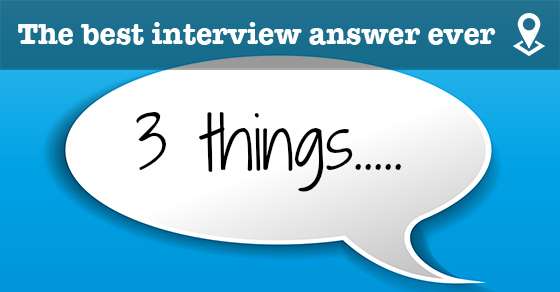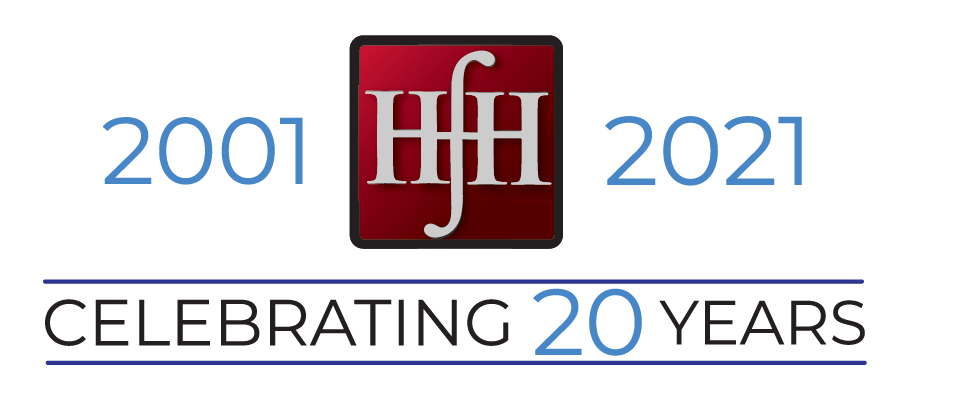So let’s imagine being in an interview. You get asked a challenging, open-ended question, such as “What makes you different as a Financial Analyst?” Or, “On that product launch you just described, what did you learn?” How do you reply when you are not sure what to say next?
I’m going to share a fun communication tip that has worked well for me over the years. When you don’t have an instant answer at the ready, say, “That’s a great question. I’m glad you asked. There are 3 things…” This is a simple but proven technique, and I can explain why this secret trick works so well.
Examples of “3 Things” in action
Let’s go back to our hypothetical questions and as a practical example of how to use this technique.
Question #1: What makes you different as a Financial Analyst?
“3 Things” Example Response:
Great question. I appreciate you asking about what makes me different as a Financial Analyst. Three things come to mind:
First, I have experience working in a similar setting, at a midsize manufacturing company, so I know the types of issues that come up. I can get up to speed quickly.
Second, I’ve had experience with the same technology systems and processes you mentioned that you also use here.
Third, I am known for talking business first, and Financial Analyst second. What I mean by that is I listen to understand the business needs, and then work to produce reports in that language, based on what the leaders care about.
If you were the hiring manager, how would you feel after hearing that answer?
Question #2: On that product launch you just described, what did you learn from it?
That product launch was an amazing experience, and I definitely learned a lot that has helped me with future projects. Let me think for a moment. I’d say three things come to mind:
First, I learned to consider possible delays. I’m naturally an optimistic person and assumed our development vendor would deliver on time as promised, but they fell behind. While we still launched on time, everyone had a few late nights. Now I always check in on weekly progress and add in a few days of time to plan for the unexpected.
Second, I learned the power of marketing analytics. On this product launch we worked hard to develop key metrics and data tracking so when I had to present to my executive leaders on the project, I was ready and they were impressed with the numbers and presentation style, which I still use to this day.
Third, I learned how to be the “voice of the customer” by providing direct, specific customer feedback on issues we were having (it was a checkout issue in the shopping cart). While Engineering pushed back saying, “It works fine,” I had to demonstrate with customer feedback that the user experience was confusing. We developed a new system in a day. Developers were still skeptical, so we did an A/B test and overwhelmingly found that customers liked the new flow.
Another solid answer that will leave the interviewer nodding and writing.
Why “3 Things” works
If you liked these answers, you might be surprised why. Here’s a test: Without cheating, how many of the three reasons from the first example can you remember? Maybe one? Even if you can’t remember any details, however, you likely recall a general sense that it was a good answer to the question. Why?
Organized & Confident – People will remember that you seemed confident and organized. After all, if you had three points in your answer, you must know what you are talking about! It shows you are a good communicator and can organize your thoughts into a few key points. Sometimes, how you answer the question is just as important as what you say.
Take Notes – People love lists. That is why so many marketing articles and blog posts include things like the top 10 one-liners, the top 5 things to look for in buying a new car, 7 reasons to paint your house a new color, etc.
When we hear a list coming, we naturally want to write it down. The interviewer will pick up a pen and start writing down the number one and your answer. This creates organization and order in the recruiter’s notes, which gives a positive impression and engages the listener by signaling that something important is coming up.
Rule of Three – There are lots of studies about the number three being balanced and orderly. You see this ranging from the Trinity, to interior design, and trilogy series.
My favorite example is from the Marines. Apparently, in the heat of battle, even highly trained military personnel can only remember three key objectives at most, which makes sense. Sticking to the Rule of Three, forces combatants to focus on what is most important and not get caught by “mission creep” with too many objectives.
Bonus points if you noticed I have 3 main points to this article.
“3 Things”: How to use it
Trust it. I rarely know what I’m going to say next when I use this reply. Yes, that sounds scary and risky. But the mind can work quickly, and you’ll be surprised at how you can develop a clear answer in a few seconds.
Buy yourself some valuable time by repeating the question or asking the interviewer to clarify. That will give you a second to come up with the first answer. Think of a second while you answer the first, and then the third while answering the second.
Once you commit to this, you need to complete it. If that sounds like too much pressure, remember that it’s better to give mediocre answers inside a great framework than a polished, forgettable response. Say it with confidence, own the answer with your body language, and your listener will think you are more profound than you might think.
Practice it. The “3 Things” response is a skill that doesn’t come naturally for most people. It takes a little practicing to declare your three-part answer before you know what it is. Practice in social settings with friends and family to give yourself a personal challenge. If you get any open-ended question, like “How was your weekend?” or “What is new with the kids?,” start your answer with, “Well, three things come to mind. First…”
Don’t worry about having perfect answers, just push through and you will do better than you realize.
Save it. You can use this tactic more than once in an interview, but save it for the tough questions or the very open-ended ones. Don’t use it on every other answer, or it will seem repetitive and odd. You want all of your answers to feel conversational and natural.
For more helpful job search tips: Ultimate Job Search Guide: Recruiter Insider Tips



